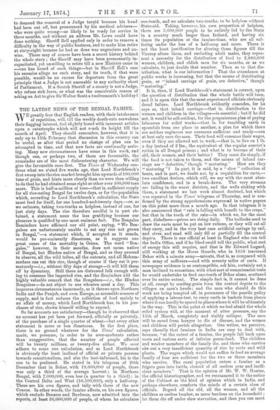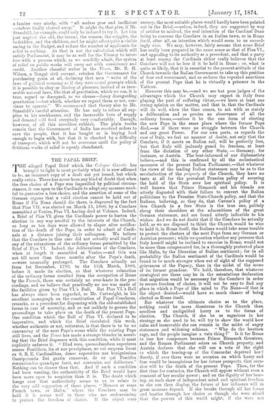THE LATEST NEWS OF THE BENGAL FAMINE.
WE greatly fear that English readers, with their intolerance of repetition, will, till the weekly death-rate reawakens their flagging interest, feel slightly bored with incessant articles upon a catastrophe which will not reach its height till the month of April. They should remember, however, that it is only up to 15th February that discussion in this country can be useful, as after that period no chabge of plan can be attempted in time, and that new facts are continually arriv- ing. Many new circumstances have come in this week, and though one, or perhaps two, of them are favourable, the remainder are of the most disheartening character. We will give the favourable ones first. The Times of Wednesday con- firms what we stated five weeks ago, that Lord Northbrook's first swoop into the rice market brought him upwards of 100,000 tons of grain, and hints more clearly than we were then willing to do that he had obtained some right or other over 400,000 tons more. This is half-a-million of tons—that is, sufficient supply for all rice-eating Bengal for twelve days, or for the population which, according to Lord Northbrook's calculation, the State must feed for itself, for one hundred-and-twenty days,—or, as we estimate, taking two-tenths as helpless, instead of one, for just sixty days. The rice therefore needful is in part ob- tained, a statement none the less gratifying because our pleasure is qualified by one most ominous fact. The Bengalee Zemindars have affirmed our old point, saying, "We Ben- galees are unfortunately unable to eat any rice not grown in Bengal,"—a statement which, if accepted as it stands, would be pre-eminently disastrous, as it suggests one great cause of the mortality in Orissa. The word "Ben- galee," however, in their mouths, does not mean native of Bengal, but Hindoo native of Bengal, and as they proceed to observe, all the wild tribes, all the outcasts, and all Moham- medans can eat this rice, though of course if they eat it pre- maturely—i.e., without fifty days of storage—it will kill them off by dysentery. Still there are distressed folk enough will- ing to consume the imported rice, and the Zemindars add the highly valuable remark that the Bengalees—i.e., the Hindoo Bengalees—do not object to one wheaten meal a day. This improves circumstances immensely, as it throws open Northern India and the Punjab, and even Europe, as accessible sources of supply, and in fact reduces the collection of food mainly to an affair of money, which Lord Northbrook has, in his pur- chases of rice, shown himself willing to expend.
So far accounts are satisfactory—though be it observed that no account has yet been put forward, officially or privately, of the purchase of a single quarter of wheat—but every other statement is more or less disastrous. In the first place, there is no ground whatever for the Times' calculation, made, we presume, in order to be over-moderate rather than exaggerative, that the number of people affected will be twenty millions, or twenty-five either. We must adhere to some one calculation, and as Lord Northbrook is obviously the least inclined of official or private persons towards sensationalism, and also the best-informed, his is the one to be preferred. He stated in his telegram of 20th December that in Behar, with 19,000,000 of people, there was only a third of the average harvest ; in Northern Bengal, with 7,000,000, even less (a quarter to a third); in the Central Delta and West (10,500,000), only a half-crop. These are his own figures, and tally with those of the new Census. In other words, the famine affects, on his own figures, which exclude Benares and Burdwan, now admitted into the reports, at least 86,000,000 of people, of whom he calculates . one-tenth, and we calculate two-tenths, to be helpless without State-aid. Taking, however, his own proportion of helpless, there are 3,600,000 people to be entirely fed by the State l in a country much larger than Ireland, and having six times its population at the famine-time, who are all suf- fering under the loss of a half-crop and more. There is ' not the least justification for altering these figures till the Viceroy alters them, and excluding adult males, they repre- sent a necessity for the distribution of food to 2,880,000 women, children, and oldish men for six months, or as we calculate, to just double that number. Then as to that dis- tribution, what is our information ? That the attendance at public works is increasing, but that the means of distributing grain, or "inland carriage of grain, are defective," though "maturing."
It is, then, if Lord Northbrook's statement is correct, upon the question of distribution that the whole battle will turn, and it is upon this that the most experienced officials obviously dread failure. Lord Northbrook evidently concedes, for he says so, that inland carriage—that is, distribution to the women and children in the villages—is essential ; but if he did not, it would be self-evident, for the preposterous plan of paying labourers for -relief works—that is, for tumbling earth in spoonfuls from one place to another, a plan for which there are neither engineers nor overseers sufficient and ready—can at best only save the men. Their food will consume their wages, even if they are allowed not to work,—that is, to live on 1 lb. a day instead of 2 lbs., the equivalent of the regular convict's ration in all Bengal prisons ; and what is to become of their old, their women, and their babies? They must die simply, if the food is not taken to them, and the means of inland car- riage are " defective," though " maturing." How are they " maturing "? In part, it is said, by a " slow " collection of boats, and in part, we doubt not, by a requisition for carts,— two excellent devices, which will, we say with the most abso- lute confidence, end in a break-down. The very streams are failing in the worst districts, and the wells sinking with them, a statement we last week almost doubted, but which was repeated in the Times' telegram of Thursday, and is con- firmed by the strong apprehensions expressed in native papers on this point more than a month ago. In that telegram it is also announced that "rain is falling with benefit to the crops," but that in the teeth of the rain—in which we, for the most part, disbelieve—prices are rising daily. The bullocks used to draw the carts must be put on low rations, or they will eat all they carry, and in the very best case artificial cartage by rail, and river, and road will only fill or partially fill the central depeots. There is one official at least in England who can tell the India Office, and if he liked could tell the public, what sort of energy this will require, and that is Sir Edward Lugard, still working at the Horse Guards, who in 1858 traversed Behar with a minute army—minute, that is, as compared with this army of sufferers—and with seventy miles of carts. If newspaper evidence is so contemptible, ask him, certainly not a man inclined to sensations, with what sort of commissariat train he would undertake to feed one-tenth of Behar alone, scattered over its entire extent. The simple fact is, it cannot be done at all, except by sending grain from the central depots to the villages on men's heads ; and the men who should do this• work are being tempted off, in pursuance of the puerile policy of applying a labour-test, to carry earth in baskets from places where it can hardly be spared to places where it will be ultimately in the way. This is the point at which we feel afraid the whole relief system will, at the moment of utter pressure, say the 15th of March, completely and visibly collapse. The men will be saved from hunger to die of disease, and the women and children will perish altogether. One writer, we perceive, says cheerily that famines in India are easy to deal with, because, "at the outset of a famine, the people fall back upon roots and various sorts of inferior green-food. The children and weaker members of the family die, and those who survive eke out a very insufficient quantity of rice by roots and wild plants. The wages which would not suffice to feed an average family of four are sufficient for the two or three members who survive. The rural population enters a famine as a frigate goes into battle, cleared of all useless gear and ineffi- cient members." That is the opinion of Mr. W. W. Hunter, the official historiographer, and we recommend it to the notice of the Cabinet as the kind of opinion which in India, and perhaps elsewhere, comforts the minds of a certain class of officials. Regard all the old, all the women, and all the children as useless lumber, as mere burdens on the household ; let them die off under slow starvation, and then you can meet
a famine very nicely, with "all useless gear and inefficient members finally cleared away." It might do, that plan, if Mr. Stansfeld, for example, could only be induced to try it. Let him just neglect the old, the insane, the women, the cripples, the bedridden, and the children, and he might effect quite a visible saving in the Budget, and reduce the number of applicants for relief to nothing. As that is not the calculation which will satisfy Parliament, it may be as well for the Viceroy to inter- fere with a process which, as we candidly admit, the system of relief on public works will carry out with consistency and credit. Another cheerful writer in the Times, Mr. It. H. Wilson, a Bengal civil servant, rebukes the Government for purchasing grain at all, declaring that men " write of the laws of political economy as if they were moral precepts which it is possible to obey or disobey at pleasure, instead of as inex- orable natural laws, like that of gravitation, which we can, it is true, regard or disregard, as we choose—fancy disregarding gravitation !—but which, whether we regard them or not, con- tinue to operate." We recommend that theory also to Mr. Stansfeld's careful attention. He has only to refuse all sup- plies to his workhouses, and the inexorable laws of supply and demand will feed everybody very comfortably. Enough, however, of all this merciless rubbish. The plain truths remain that the Government of India has received orders to save the people, that it has bought or is buying food enough to begin with, but that it is checked by a difficulty of transport, which will not be overcome until the policy of fictitious works of relief is openly abandoned.



































 Previous page
Previous page